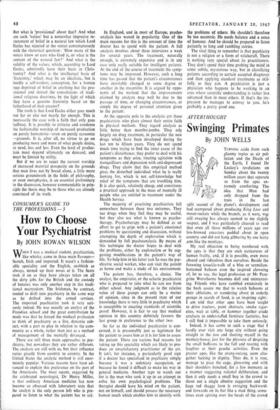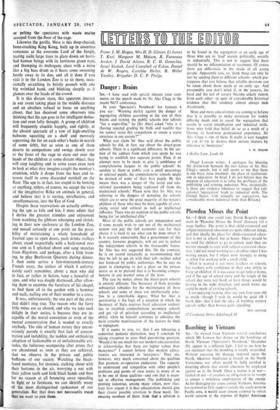Swinging Primates
AFTERTHOUGHT
By JOHN WELLS
gloomy topics as air pol- lution and the Death of the Earth, I found Dr Leakey's revelations on Sunday about the twenty million years that separate us from the apes ex- tremely comforting. The idea that Man had only dropped from the trees in the last split second of the planet's development and had scampered about producing King Lear and moon-rockets while the branch, as it were, w4s still swaying has always seemed to me slightly suspect, and I was particularly cheered to read that even all those millions of years ago our low-browed ancestors padded about in open country and did not hang gibbering by one hairy arm like the monkeys.
My real objection to being numbered with the apes is that they are such caricatures of human frailty, and, if it is possible, even more absurd and ridiculous than ourselves. Beside the frowning knuckle-walk of a blue or vermilion- bottomed baboon even the inspired clowning of, let us say, the legal profession or Mr Pere- grine Worsthorne becomes dull and uninterest- ing. Friends who have rambled extensively in the bush assure me that to watch baboons at their ablutions, or wandering about in orderly groups in search of food, is an inspiring sight: I am told that other apes have been taught to drive tractors, paint abstracts, smoke cigar- ettes, wait at table, or hammer together crude artefacts in understaffed furniture factories, but I still find it impossible to take them seriously.
Indeed, it has come to such a stage that I hardly ever visit any large city without going straight to the zoo and shutting myself in the monkey-house, just for the pleasure of despising the small buffoons to the full and roaring with laughter at their gauche activities. Even the greater apes, like the orang-outang, seem alto- gether lacking in dignity. They do, it is true, manage to pace the cage, glowering and with their shoulders hunched, for a few moments in a manner suggesting rational deliberation, and then it only needs a small boy in the crowd to shout out a single abusive suggestion and the huge red shaggy loon is swinging backwards and forwards on its bar like a mad thing, some- times even spitting over the heads of the crowd
or -pelting the spectators with waste matter scooped from the floor of the cage.
Likewise the gorilla. Here is this deep-chested, bone-crushing King Kong, built up in countless romances as the awesome Lord of the Jungle,
tearing aside large trees to glare down on horri- fied human beings with its luminous green eyei,
and thumping its mahogany chest with a noise like a big bass drum as it bears some swooning lovely away to its den, and all it does if you visit it in the London Zoo is to sit there, occa- sionally scratching its bristly paunch with one big wrinkled hand, and blinking sleepily as it glances over the heads of the crowd. , It is this distant stare, this apparent interest in any event taking place in the middle distance and an absolute refusal to focus on anything closer, that has deceived some observers into thinking that the ape goes in for intelligent deduc- tion and even lofty thought. A group of children will frequently chuckle happily, and rightly, at the absurd spectacle of a row of high-smelling baboons squatting on a shelf and morosely separating the fur on each other's backs in search of some titbit, but as soon as one of them deserts its companions and swings slowly over to the front of the cage to stare out over the heads of the children at some distant object, they will stop laughing and in some cases even turn to look at what they imagine caught the monkey's attention, while it drops from the bars and in- terests itself in some discarded nutshell on the floor. The ape is, in fact, too stupid to be looking at anything, unless, of course, we accept the view of the imaginative Rilke on animals in general, and believe that it is staring, unreflective, and unselfconscious, into the Eye of God.
Despite these reservations on actually embrac- ing the ape as kith and kin, I must admit that I derive the greatest stimulus and enjoyment from watching the gibbons whooping and shriek- ing in their new enclosure at the London Zoo, and mused seriously at one point on the possi- bility of maintaining a whole household of liveried apes to open doors, push drinks trolleys about, stand respectfully with a bath-towel over one arm as I splashed about and sang snatches from Rigoletto, and perhaps, after a little train- ing, to play Beethoven Quartets during dinner. I then came across a late-nineteenth-century French story, the author of which I unfortu- nately can't remember, about a man who did in fact, or rather in fiction, keep a houseful of apes, and who was deeply distressed, after allow- ing them to examine the furniture of his chapel, to find them all in the garden with a hammer and nails, nailing one of their number to a cross.
It was, unfortunately, the one part of the story that didn't ring true. The reason why the furry little mites are so absurd, and why we take such delight in their antics, is because they are in- capable of the moral conviction or even of the mental concentration that is needed to crucify anybody. The side of human nature they uncon- sciously parody is exactly that lack of concen- tration and instability, the sudden and unthinking adoption of fashionable or of unfashionable atti- tudes, the ludicrous scampering after prizes that are abandoned as soon as they are achieved, that we observe in the private and public buffoons of our society. Watching the black- faced monkeys, for instance, stalking about with their bottoms in the air, worrying a nut with their yellow teeth and little black hands and then for no reason at all bouncing away squealing to fight or to fornicate, we can identify many of the most distinguished spokesmen of our generation. But that does not necessarily mean that we want to join them.



































 Previous page
Previous page